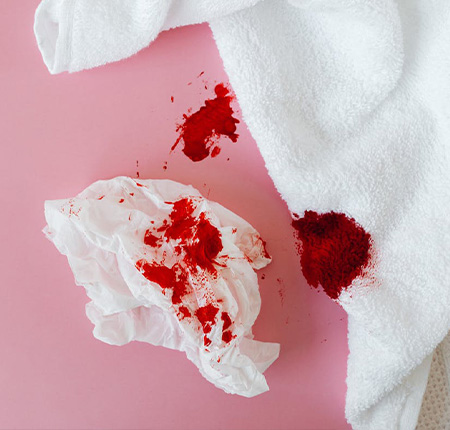
Bad smelling menstruation - Causes, Solutions & When to see a doctor
“Am I not changing my pad often enough?” You’ve probably asked yourself this at least once when you noticed that your period … smells. Maybe you even felt embarrassed or ashamed.
Our dear, there is nothing shameful about your period – not even the smell! It is perfectly normal for menstrual blood to have a specific smell, just as it is natural for each vulva to have its own smell. Indeed, if menstrual blood has a heavy and unpleasant smell, it could indicate an infection. But even then there is no need to be ashamed, but to go to the doctor to solve the problem as quickly as possible. And if you are not sure what is normal and what is not, stay with us until the end to tell us about the types of unpleasant menstrual odors and what each one means.
Why does menstruation smell?
The fact that menstruation has a slight odor, which women sometimes describe as "nasty", is actually normal and is due to the presence of menstrual blood and bacteria in the vagina.
It is normal for bacteria to be present in the vagina. Their numbers fluctuate depending on many factors. When these bacteria are present, along with menstrual tissue and blood, they can alter the normal pH of the vagina and automatically cause different odors.
Vaginal pH can also change in the presence of pads and tampons that contain perfumes and other toxic chemicals, or when you use intimate hygiene products such as soaps and gels with parabens, sulfates, and fragrance. If these are part of your menstrual care routine, they may be the reason why you feel like your period smells bad. It is, in fact, just a reaction. That is why it is recommended to choose organic products for your intimate area, made only from pure ingredients, with a neutral pH and without fragrance – such as Enroush menstrual products.
Wearing the same pad or tampon for a long time can also cause unpleasant odor in the intimate area, as bacteria and sweat accumulate. This is especially true towards the end of your period, when your bleeding is not as heavy and you don't need to change your menstrual products as often. As a rule, it is recommended to change your menstrual products every time they are full, or at least every 4-8 hours. The more often you change them, the less that specific odor will be felt.
And last but not least, if the smell of your period is really strong, unusual, and unpleasant, it may be a sign of an infection, especially if it is accompanied by other symptoms such as discomfort, burning, itching, pain, or fever. It is recommended to visit your gynecologist as soon as possible if you are concerned, to determine the exact cause.
Menstruation - Types of unpleasant odors
There are several types of odors that can be considered unpleasant when talking about menstruation. Here are what they are, and what each one can tell you about your body and health:
Menstruation with a metallic smell
The slightly metallic smell of blood is not only normal, but it can actually indicate a healthy period. The metallic smell, which resembles that of a copper coin, is due to the presence of iron in the blood and bacteria in the vagina. What's more, this smell doesn't linger long after your period ends.
Menstruation with sweat odor
You may notice that your period has a smell similar to sweat. Contrary to popular belief, this is not always associated with poor hygiene.
Yes, it is important to pay special attention to intimate hygiene during menstruation to prevent the accumulation of bacteria and sweat: change your pad on time and wash yourself every day, at least once or more, or use unscented intimate wipes. But this does not mean that a sweat-like smell automatically indicates negligence in hygiene.
In reality, a period with a smell of sweat can also be due to the apocrine glands in the genital area. The sweat produced by these glands, especially during periods of stress and anxiety, comes into contact with bacteria on the skin and produces a specific odor.
Menstruation with a rotten smell
Foul-smelling menstruation falls into the "not normal" category.
If you notice a strong, foul-smelling, putrid odor, it could mean either an infection or a foreign body in your body—a tampon, for example, that you forgot you had and left in for too long. In this case, you'll either need to find the string and remove it immediately, or go to the doctor if you can't find the string and have it removed.

Sweet smelling menstruation
Another common situation is when your period has a slightly sweet smell. This is due to the acidic environment in the vagina and the presence of bacteria, so you don't really have any reason to worry.
Menstruation with a fishy odor
Whether you're menstruating or not, a strong, unpleasant odor, often described as "fishy," is not normal in the intimate area. Whether you experience this odor during or outside of your menstrual period, it's often associated with an infection.
Bacterial vaginosis, for example, is a vaginal infection caused by an excessive buildup of bacteria in the vagina, the risk of which increases if you douche or have unprotected sex with multiple partners. Vaginosis can cause a fishy odor that intensifies during menstruation, when the presence of menstrual blood increases the alkalinity of the vaginal environment.
Trichomoniasis is another infection, this time sexually transmitted, which can manifest itself through itching, burning, pain, and an unpleasant fishy odor in the intimate area.
If you notice such an odor in your intimate area, visit your gynecologist as soon as possible for diagnosis and treatment.
Menstruation with an unpleasant odor - What diseases can it hide?
Foul-smelling menstruation can be a clear sign of infection or other health problem when it persists. Some of the most common conditions behind unpleasant menstrual odor include:
- Vaginal infections: such as bacterial vaginosis, due to an imbalance in the vaginal flora.
- Sexually transmitted diseases: such as trichomoniasis, chlamydia or gonorrhea.
- Uterine fibroids: can cause menstrual bleeding with large clots, an unpleasant odor, and severe cramps.
Foul-smelling menstruation - When should you see a doctor?
The first and most obvious warning sign is the symptoms associated with bad smelling menstruation. Schedule a visit to the gynecologist as soon as possible if, in addition to bad smelling menstruation, you also notice:
- Yellow or green vaginal discharge, which may indicate an infection
- Symptoms of menorrhagia (heavier than usual bleeding)
- Stomach pain or pelvic pain
- Severe menstrual cramps , or stronger than usual
- Other unusual symptoms (itching, burning when urinating, pain or discomfort in the intimate area)
- Fever
These are just a few of the worrying signs that tell you that something is wrong with your body. But you know your body best, so you don't have to wait for these symptoms to contact your doctor.
If you have any suspicions about your menstrual or reproductive health, you can contact your gynecologist at the first unusual changes in your menstruation, whether related to odor, flow, or other symptoms.

Hygiene rules during menstruation
The good news is that there are a lot of steps you can take to help prevent unpleasant odors from building up and give your intimate area the hygiene and gentle care it needs during your period. Here's what you can do to always feel clean and confident:
- Change your menstrual products frequently: whenever needed, or every 2-8 hours, to always feel clean. Choose pads and tampons with 100% organic cotton that let your skin breathe and do not cause irritation, to prevent the accumulation of bacteria, moisture and unpleasant odors.
- Wash your intimate area daily: during your menstrual period, you can even take 2-3 showers a day to keep yourself fresh. Avoid internal douches that can unbalance your intimate pH, and only wash the outside of the vagina, using an antibacterial intimate gel with natural ingredients, without perfume or harmful chemicals.
- Wear loose clothing and cotton underwear: unlike synthetic fibers, cotton does not suffocate the skin and prevents the accumulation of sweat and unpleasant odors.
- Change your underwear every day: even if you change your pad several times a day, it is important to change your underwear daily to avoid the accumulation of bacteria.
- Avoid perfumes and scented soaps in the genital area: you don't need perfume in your menstrual products, toilet paper, or intimate gel, but only pure ingredients that take care of your intimate health.
Treatment & Remedies for Foul-Smelling Menstruation
Solutions for smelly menstruation differ depending on the type of unpleasant odor and its underlying cause.
For example, in the case of a metallic, sweet or sweaty odor, medical treatment is not necessary. Sprays or special substances for “cleaning the vagina” are also not recommended, as they only mask the odor and, in fact, disrupt the fragile balance of the vaginal flora, making it even more vulnerable to infections.
It's enough to take care of your intimate care routine: how and how often you wash, what ingredients your menstrual products contain, and what menstrual hygiene products you choose.
In the case of an unpleasant odor caused by an infection, such as a fishy or rotten smell, treatment is prescribed by the gynecologist, depending on the diagnosis. Bacterial vaginosis, for example, is treated with antibiotics. Similarly, for trichomoniasis, the doctor will prescribe a certain type of oral antibiotics.
Frequently asked questions about smelly menstruation
We know, it's uncomfortable to experience an unpleasant odor in your intimate area when you're on your period. But with a little attention to the label of your menstrual care products and your daily self-care routine, you can prioritize your intimate health and avoid odor buildup.
If you're still unsure about how to do this, in this section we've answered the most frequently asked questions about smelly menstruation.
In which direction should you wash your genital area?
It is important which direction you wipe when using the toilet: from front to back, to avoid spreading bacteria from the anus to the vagina.
As for how you should wash your genital area, it is recommended to avoid internal showers and only wash the outside, the vulva, anus, and the area between the vagina and anus, with a natural intimate gel.
How often should you wash your intimate area during menstruation?
During menstruation, your hygiene routine requires a little more attention, so you can increase the frequency of washing your intimate area. It is recommended to wash daily, at least once a day, but you can wash even 2-3 times a day if you feel the need.
Are scented intimate hygiene products recommended during menstruation?
No, products that contain perfume and other harmful chemicals are not recommended for the intimate area, neither during nor outside of menstruation, because they can irritate you and disrupt your intimate flora.
Use pads and tampons made with 100% organic cotton and choose a gel or intimate wipes that do not contain perfume or ingredients dangerous to your genital health.
Why does your private area smell bad after your period?

Bacteria, the acidity of the vaginal environment, and the fact that you no longer change your pad as frequently because you are no longer bleeding heavily are factors that contribute to the accumulation of unpleasant odors in the intimate area at the end of menstruation.
However, if the odor persists, does not go away when you wash, or is accompanied by other unusual symptoms, see a doctor as it could indicate the presence of an infection.
Does diet influence the smell of menstruation?
There are many popular beliefs and trends that tell us that what we eat influences our intimate odors, including during menstruation. But in reality, there is no conclusive evidence to support these theories.
According to scientific data, food cannot directly influence the uterus, vagina, or reproductive organs, because any food consumed actually passes through the stomach and intestines. Food does not come into direct contact with the reproductive system, so it cannot influence odors in the genital area.
How do you know if you have a vaginal infection?
An unpleasant, putrid or fishy smell in the intimate area that persists despite all hygiene measures can be a clear sign of a vaginal infection, especially if you also have other symptoms (unusual discharge, discomfort or pain in the genital area, fever, etc.). A visit to the doctor along with the necessary investigations can confirm whether you really have an infection.
Photo source: Pexels.com

an ENROUSH account.
Let's create a new account for you!


















